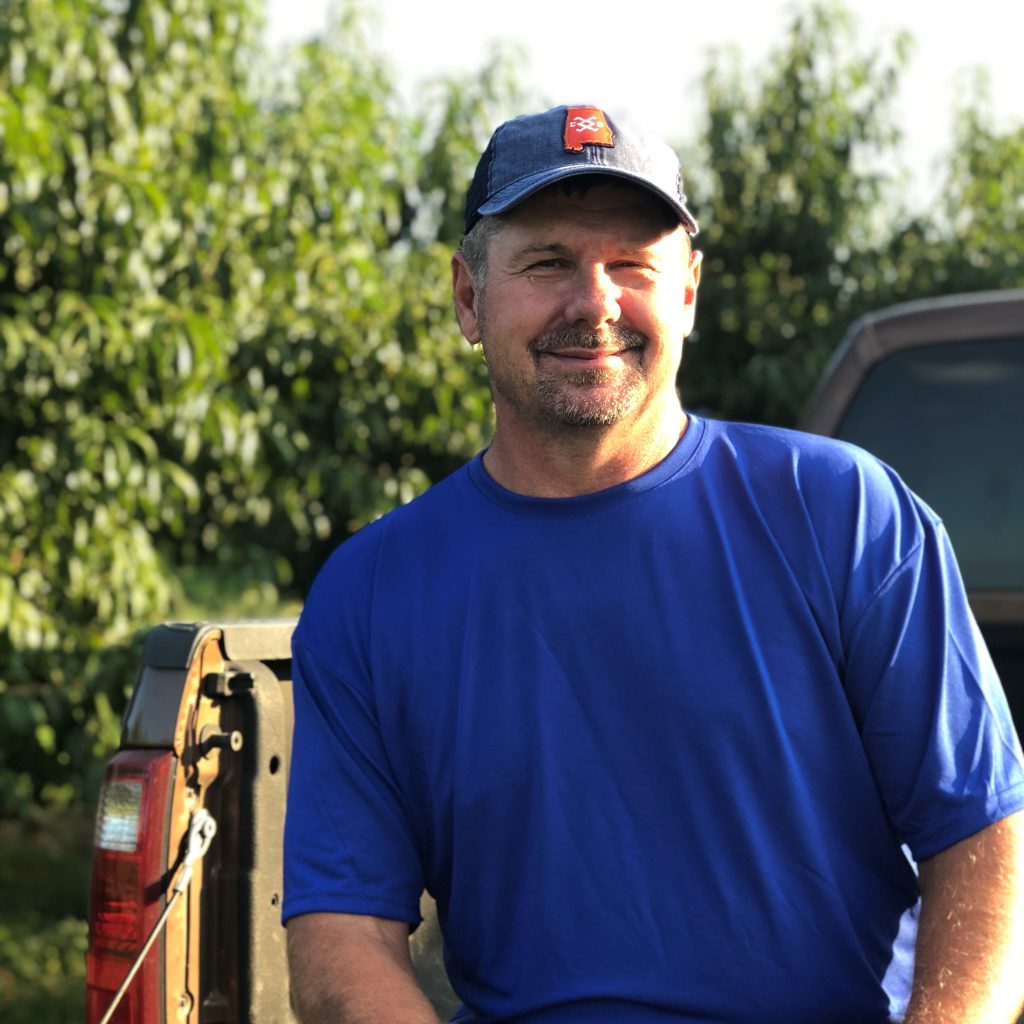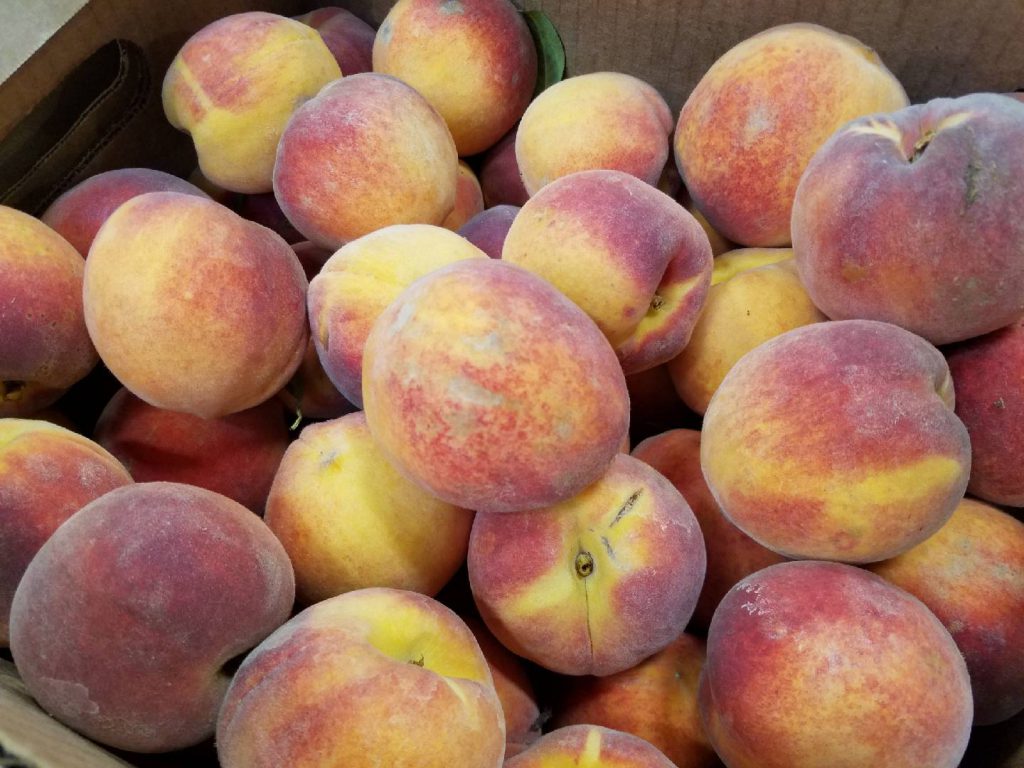 Cahaba Brewing Company‘s Proximity Series, supporting REV Birmingham’s Urban Food Project, has a new hyperlocal brew in its collection. The most recent farm-to-glass beer is a Peach Berliner Weisse, made with peaches from Witt Farms in Hayden.
Cahaba Brewing Company‘s Proximity Series, supporting REV Birmingham’s Urban Food Project, has a new hyperlocal brew in its collection. The most recent farm-to-glass beer is a Peach Berliner Weisse, made with peaches from Witt Farms in Hayden.
Farmer Jimmy Witt has been working with the Urban Food Project since 2013. Witt’s strawberries, famous for U-pick as well as plant sales to farms across the state, were used to create the very first Proximity Series beer. The strawberry blonde sold out in only three hours at Cahabazaar in June.
 But Witt Farms does much more than strawberries. Witt also grows blackberries, tomatoes, cucumbers, squash, zucchini and, of course, peaches.
But Witt Farms does much more than strawberries. Witt also grows blackberries, tomatoes, cucumbers, squash, zucchini and, of course, peaches.
In fact, 400 pounds of Witt Farms peaches went to Cahaba Brewing for this batch. The locally-sourced peach beer is available now in Cahaba Brewing’s taproom and will be available next week at a number of Urban Food Project supporting restaurants who source Alabama grown ingredients through REV’s local food initiative. Restaurants and retailers serving this exclusive small-batch seasonal brew include:
- Slice
- Soho Social
- Ovenbird
- J Clyde
- Post Office Pies
- 5 Point Public House
- Piggly Wiggly Clairmont
- Piggly Wiggly Crestline
- Grand Bohemian
- Eugene’s Hot Chicken
- John’s City Diner
- Roots & Revelry
- Hop City
- Dyrons

Witt Farms is a 70-acre farm started by Witt’s grandfather in 1958. It is home to about 18 acres of peach orchards that Witt’s father brought to the family farm after returning from service in the Navy and working with family members at Hazelrig Orchards.
When Witt was growing up, the family grew mainly peaches with some plums and nectarines. When he enrolled at Auburn University, he intended to get out of the family business and instead study forestry. But farming called him, and he ultimately changed his major to horticulture, earning Bachelor of Science and Master of Science degrees in the field. As an adult returning to the farm after college, he recognized the need for diversification of crops.
“It was feast or famine,” Witt said of the peach orchard years earlier in his life. “You never have a good crop on everything every year. It’s easier to maintain a living when you have diversification.”
While Witt had been away at college, his father had started experimenting with growing strawberries. Witt expanded that and also added in blackberries and the rest of the vegetables now grown at Witt Farms. While in college, he had worked for one of his professors who had a nursery business, which grew Witt’s interest in greenhouses – which can be found at his farm now, housing the tomato crops. Witt Farms currently has three separate peach orchards, each in different phases of their life cycles.
The fourth generation of Witt Farms is already helping run the farm. Witt’s son and son-in-law will likely take it on next; his daughter works for the Farm Service Agency. Although it’s too early to determine the fifth generation’s aptitude for farming, Witt’s three grandchildren certainly love their green-thumbed “Pop Pop.”
Related News
-
Why we say yay to two-way streets
Filed Under: Developer, Downtown Birmingham, Filling Vacant Spaces, Front Page, Transportation, Yaysayers
REV Birmingham is a long-time advocate for making the switch to two-way streets downtown, and this is something recommended by planners studying our downtown for years. In fact, the team that developed the 2004 City Center Master Plan recommended many street changes but noted 4th Avenue North conversion should take place “immediately.” We believe this project is a catalytic moment for Birmingham – but you may find yourself wondering why that is.
-
The Key Tool for Urban Revitalization: Downtown BHM's Business Improvement District
Filed Under: Business-Proving, Developer, Downtown Birmingham, Front Page, Get Involved, Potential-Proving, Why BHM
By the time REV took on BID management in 2018, downtown had a new set of needs from its BID. Downtown Birmingham in the ‘90s had a population mainly of 9 to 5 employees. But the downtown of 2018 had a whole new population of residents and visitors throughout the day and night. We had new opportunities to create positive experiences, inviting them into more downtown businesses and public spaces, and to keep them coming back for more.
-
Introducing the six businesses that call Nextec home
Filed Under: Business-Proving, Developer, Downtown Birmingham, Filling Vacant Spaces, Front Page, Historic Preservation, Potential-Proving, Why BHM
On the corner of 3rd Avenue and 16th Street North, you’ll find Nextec, a redevelopment of the 90-year-old, 65,000-square-foot Edwards Motor Company building (also formerly known as the Sticks ‘N’ Stuff building). With experience in historic renovation, developer Michael Mouron, chairman of Capstone Real Estate Investments, began this civic project in 2021 as a space for business startups to continue their work in the Magic City – a function encouraged by REV Birmingham.